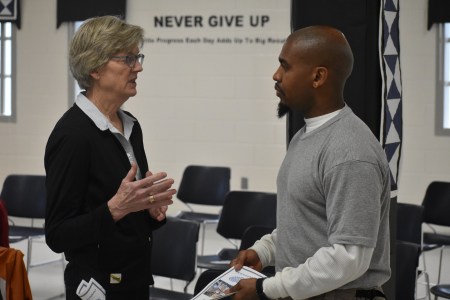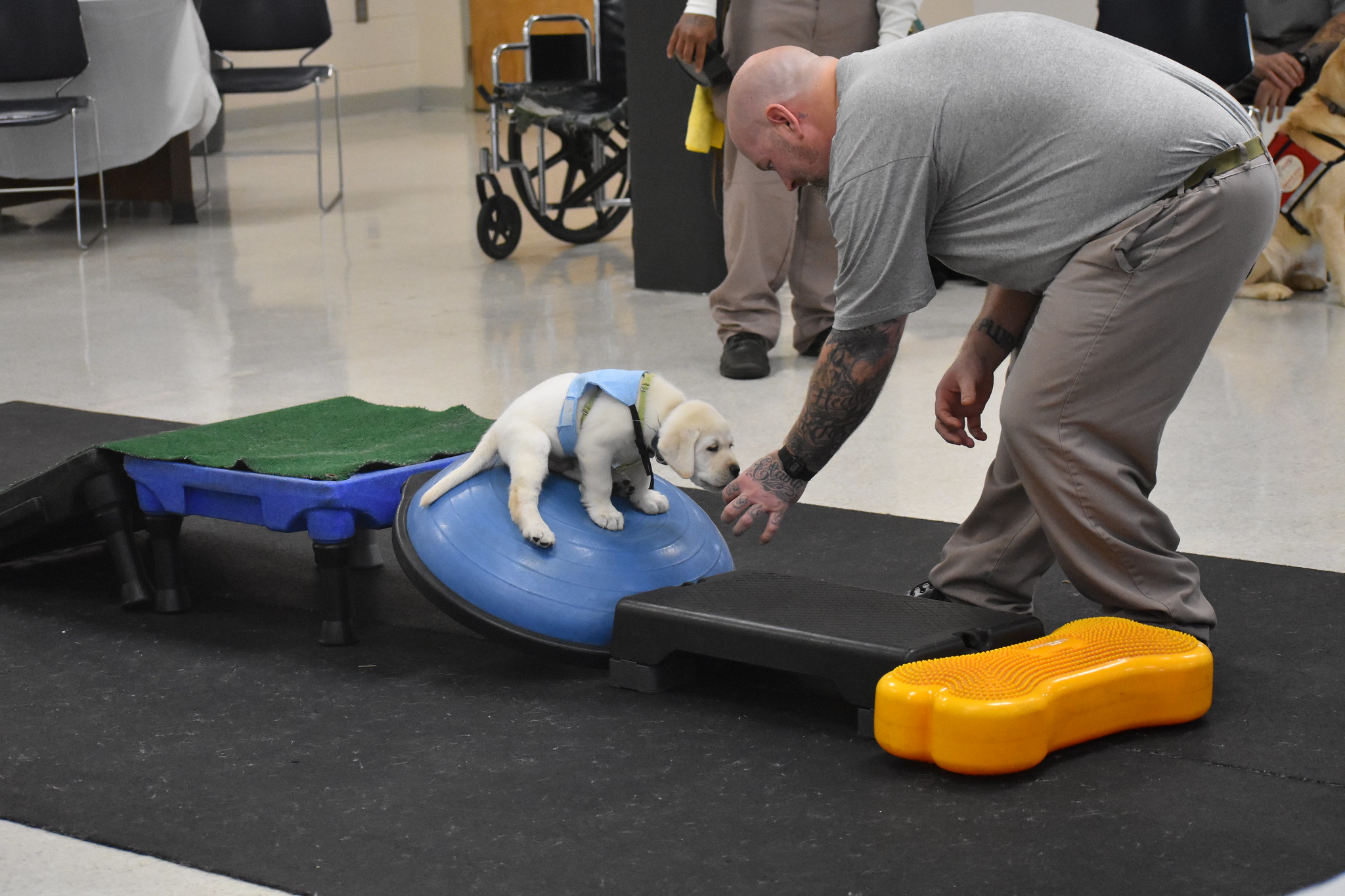In June, Jennifer Pegram got her “sidekick” Leonard, a service dog, to assist with her mobility. She has cerebral palsy, a disorder that affects her movement, balance and coordination.
In the just over six months they’ve spent together, Pegram said Leonard, a black labrador retriever, has already been life-changing. He matches his walking pattern to her gait. He helps her navigate curbs and stairs. He provides support as she gets up and down on the floor to play with her two young children.
“He’s literally my rock,” she said. “He braces me when I’m standing up.”
As her “wingman,” Pegram said Leonard has boosted her confidence in her movements and ability to navigate situations she couldn’t have before; he gives her more independence.
It took thousands of hours of specialized training to prepare Leonard to be the dog who can support Pegram in the ways she needs. Men incarcerated at Warren Correctional Institution took on the majority of that training responsibility.
As part of the At Both Ends of the Leash program at the prison, up to 16 incarcerated men live and work with nearly a dozen dogs in a dedicated cell block. The program is a partnership between the Department of Adult Correction and Eyes Ears Nose & Paws, a Hillsborough-based nonprofit that trains and places service dogs with people with disabilities.
The incarcerated men participating in the program are responsible for teaching the dogs assistance skills as well as for all the everyday caretaking tasks from feeding to bathing to grooming.
Their commitment to this work was celebrated on Jan. 25 at a leash ceremony held to recognize their talents and the lives they are helping.

Two service dogs graduated after about 18 months of training inside the prison — now prepared to be placed with community members this month.
“Keep doing what you’re doing because it does make a difference,” Pegram told the trainers at the ceremony.
They hung on to her words, pleased to see the positive results of their work.
Donte Santiago, a trainer who worked with Leonard, said it’s moving to hear from clients who are benefiting from the dogs they trained.
“I always ask God for the opportunity to give back,” Santiago said. “Prison doesn’t really allow you to do that. You can help yourself with classes and self-cognitive courses, but it doesn’t really allow you to affect someone’s life in a positive way.”
Participation in the service dog training program gives Santiago and others that opportunity, he said.
Using untapped potential
Eyes Ears Nose & Paws, founded by Maria Ikenberry and Deb Cunningham in 2008, hasn’t always worked with the prison system to train service dogs. Originally, they relied on community volunteers to raise the service dogs from puppyhood all the way until they gained the necessary skills to be a suitable medical alert or mobility dog for someone with a disability.
But Cunningham said it was hard to find enough volunteers who could make the necessary time commitment, which limited their ability to grow and produce enough service dogs to meet demand.
As they faced this problem, they learned of other service dog organizations partnering with prisons and wanted to do the same. The benefit of providing programming for incarcerated people and the expanded capacity to place service dogs in the community felt like a win-win.
Cunningham said the North Carolina prison system was on board with the idea, and the first At Both Ends of the Leash program started in 2014 at Franklin Correctional Center.
The partnership with the prison system has been fundamental, Cunningham said, allowing Eyes Ears Nose & Paws to place about 12 to 15 service dogs per year.
“One thing that offenders have is time and not a lot of ways to spend it,” Cunningham said. “Those two things are part of what makes prison programs work so very well.”
As Eyes Ears Nose & Paws has worked with incarcerated trainers for almost 10 years, Cunningham said she’s often been struck by their “untapped potential.” She’s seen incarcerated men who come in with no experience with dogs develop and hone their skills to be top-caliber trainers, rising to the challenges of finding the best ways to teach and care for the dogs.
Now, At Both Ends of the Leash is in three prisons: Warren Correctional Institution, Caswell Correctional Center and Orange Correctional Center. There are 43 total program slots across the three prisons.
Eyes Ears Nose & Paws staff and volunteers visit the prisons once a week to provide direct instruction and monitor progress to ensure the dogs learn the service skills needed for clients. A training regimen is provided for the dogs, but it’s mostly up to the trainers to execute the plan and meet the target milestones.
Since 2014, Cunningham said, the At Both Ends of the Leash program has produced 59 service dogs serving people with disabilities. Another four service dogs will graduate this month, she said.
Eyes Ears Nose & Paws also started a selective work-release program in 2016 where incarcerated trainers can join the organization as paid staff members while they are incarcerated but this time work in the community, rather than inside prison. Two formerly incarcerated trainers now work full-time as staff members at Eyes Ears Nose & Paws.
Learning at both ends of the leash
The dogs aren’t the only ones learning. Stacey Collier, associate warden for programs at Warren Correctional, said she’s seen offenders transform while participating in the program.
“I’ve seen people come into the program with almost negative personalities,” Collier said. “Now when you see them, they are so much easier to communicate with. Their outlook on serving their time in prison has changed.”
The program lives up to its name, she said.
Cunningham said the dual benefit is a vital part of At Both Ends of the Leash. Of course, she wants the trainers to become skilled at training dogs, but more importantly, she wants them to develop interpersonal and leadership skills that can translate into their lives inside and outside of prison.
Christopher Skaggs, an incarcerated trainer, said training service dogs has taught him to remain flexible and patient. For example, he said he had to spend a month teaching a dog how to pick up a credit card and, at times, it was a challenge to keep at it. Yet he didn’t stop because he had confidence that the dog could do it. That’s the same approach Skaggs said he can employ when helping his children do their homework.
Santiago, a trainer for over five years who has worked with at least 13 dogs, said every dog has taught him something about himself.
The first dog he trained, Eleven, taught him acceptance no matter the rejection, Santiago said. His latest dog, Simon, who graduated at the ceremony, taught him to be poised no matter the situation or stressors.
Need for more programs
Santiago said At Both Ends of the Leash demonstrates the transformative power of prison programs.
“This is a program for men who want to change,” Santiago said.
That’s because he said the program teaches responsibility, communication skills, teamwork, conflict resolution and more — all transferable skills that prepare men for lives outside of prison and dog training.
Rep. Marcia Morey (D-Durham), who attended the leash ceremony, said she was impressed by the program and wishes every facility in North Carolina had it. Six other prisons offer New Leash on Life programs in which offenders train dogs from county animal shelters and Humane Society shelters as companionable pets, said Department of Adult Correction spokesperson Brad Deen.

There’s a need for more prison programs, Morey said.
“If you talk to each one of these gentlemen, they will tell you it gives them hope,” she said. “There’s something to wake up for. They feel useful. They are gaining skills.”
Increasing prison programming would come at a low cost and high benefit, she said.
“If there’s nothing to do and there’s no hope and no incentive, it causes more problems among offenders,” Morey said. With implementing these kinds of programs, she added, “there’s no loss. It’s all a gain.”
This article first appeared on North Carolina Health News and is republished here under a Creative Commons license.![]()
North Carolina Health News is an independent, non-partisan, not-for-profit, statewide news organization dedicated to covering all things health care in North Carolina. Visit NCHN at northcarolinahealthnews.org.








